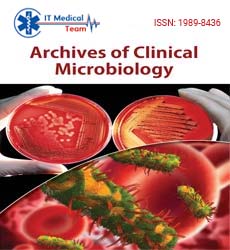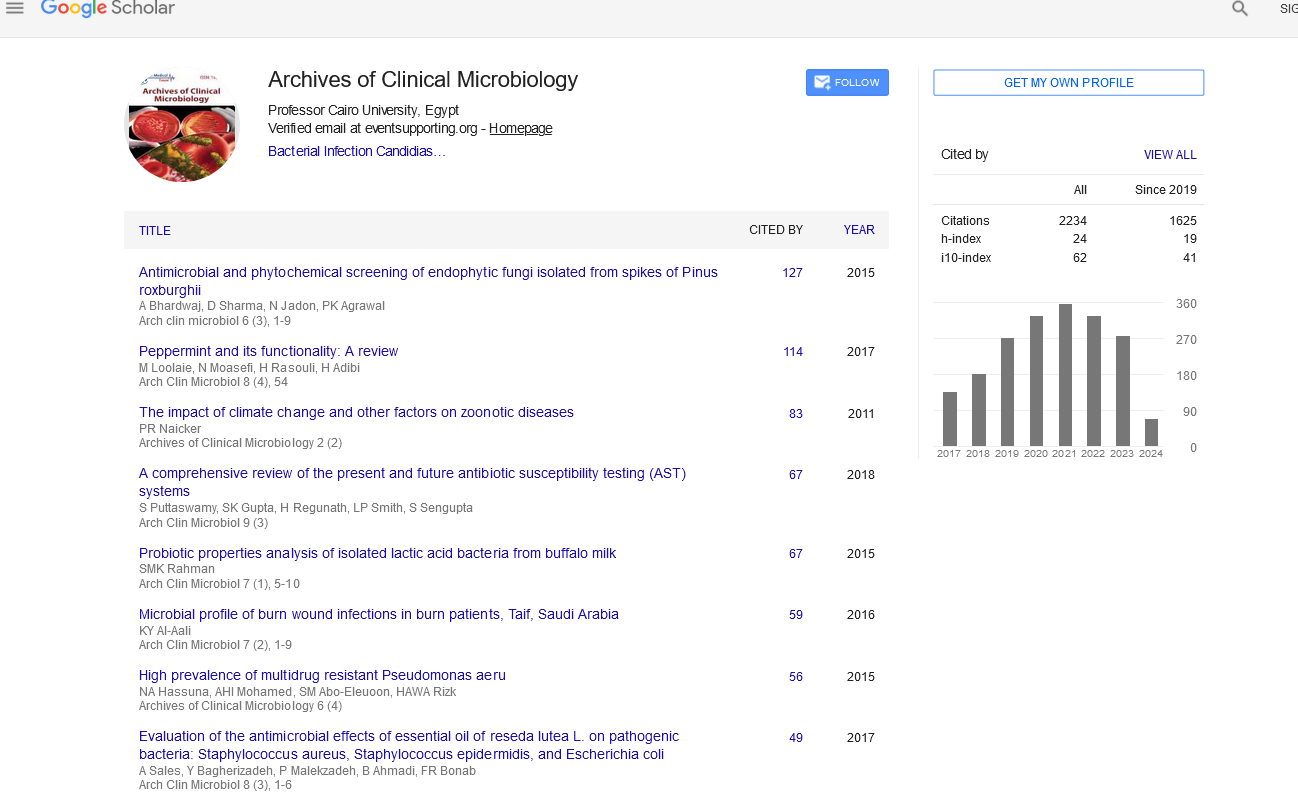Perspective - (2024) Volume 15, Issue 5
Microbiome Analysis and Its Clinical Applications
Ashok Agarwal*
Department of Microbiology and Immunology, University of California, San Francisco, USA
*Correspondence:
Ashok Agarwal, Department of Microbiology and Immunology, University of California, San Francisco,
USA,
Email:
Received: 09-Sep-2024, Manuscript No. IPACM-24-14961;
Editor assigned: 12-Sep-2024, Pre QC No. IPACM-24-14961 (PQ);
Reviewed: 26-Sep-2024, QC No. IPACM-24-14961;
Revised: 07-Oct-2024, Manuscript No. IPACM-24-14961 (R);
Published:
14-Oct-2024
Introduction
The human microbiome, consisting of trillions of microorganisms
residing in and on the human body, plays a fundamental role in
health and disease. Advances in microbiome analysis techniques
have revolutionized our understanding of microbial communities'
composition, function, and impact on human physiology. This
article explores the principles of microbiome analysis, its clinical
applications, and the potential implications for personalized
medicine and healthcare.
The human microbiome encompasses a diverse array of
microorganisms, including bacteria, fungi, viruses, and archaea,
that inhabit various anatomical sites such as the skin, oral cavity,
gastrointestinal tract, and urogenital tract. These microbial
communities form dynamic ecosystems that interact with the
host immune system, metabolism, and overall health. Advances
in high-throughput sequencing and bioinformatics have enabled
comprehensive profiling of microbial communities, offering
insights into their diversity, stability, and functional roles in
health and disease.
Microbiome analysis holds immense promise for understanding
the complex interplay between microbial communities and
human health. By elucidating microbial composition and function,
researchers and clinicians can uncover biomarkers of disease,
identify potential therapeutic targets, and develop personalized
interventions tailored to an individual's microbiome profile.
Description
Techniques in microbiome analysis
Microbiome analysis encompasses a range of molecular
techniques that enable the characterization and quantification
of microbial communities. High-throughput sequencing
technologies, such as 16S rRNA gene sequencing and shotgun
metagenomics, are commonly used to survey bacterial and
microbial DNA within a sample. These approaches provide
insights into microbial taxonomy, community structure, and
genetic potential, allowing researchers to identify specific
microbial species and their functional capabilities.
16S rRNA gene sequencing targets the hypervariable regions
of the bacterial 16S ribosomal RNA gene, providing taxonomic
classification of bacterial communities at the genus or species
level. This method is widely used for profiling microbial diversity
and comparing community composition across different samples
or individuals.
Shotgun metagenomics, on the other hand, involves sequencing
all DNA present in a sample, enabling comprehensive analysis of
bacterial, viral, fungal, and archaeal genomes. This approach
provides insights into microbial diversity, functional pathways,
and genetic potential within a microbial community. Shotgun
metagenomics is particularly valuable for studying complex
microbial ecosystems, such as the gut microbiome, and
identifying functional genes associated with health and disease.
Clinical applications of microbiome analysis
Microbiome analysis has transformative implications for
clinical practice, offering new insights into disease pathogenesis,
diagnosis, and treatment. Key clinical applications of microbiome
analysis include:
Gastrointestinal disorders: The gut microbiome plays a crucial
role in gastrointestinal health, influencing digestion, immune
function, and inflammation. Microbiome analysis has revealed
dysbiosis (microbial imbalance) in conditions such as Inflammatory
Bowel Disease (IBD), Irritable Bowel Syndrome (IBS), and
Clostridioides Difficile Infection (CDI). By characterizing microbial
signatures associated with disease states, clinicians can identify
biomarkers for early diagnosis, monitor disease progression, and
develop microbiome-targeted therapies, such as probiotics,
prebiotics, and Fecal Microbiota Transplantation (FMT).
Metabolic disorders: The gut microbiome is intricately linked
to metabolic processes, including energy metabolism, glucose
homeostasis, and lipid metabolism. Dysbiosis of the gut
microbiome has been implicated in metabolic disorders such as
obesity, type 2 diabetes, and cardiovascular disease. Microbiome
analysis can identify microbial taxa and functional pathways
associated with metabolic health, offering opportunities for
personalized dietary interventions and microbiome-modulating
therapies to improve metabolic outcomes.
Immune disorders: The microbiome plays a critical role in
shaping immune development and function, influencing
susceptibility to autoimmune diseases, allergies, and infectious
diseases. Microbiome analysis has identified microbial signatures
associated with immune dysregulation and inflammatory
conditions, providing insights into disease mechanisms and
potential therapeutic targets. Manipulating the microbiome
through probiotics, dietary modifications, or microbial-based
therapies may modulate immune responses and mitigate
disease severity.
Skin disorders: The skin microbiome, composed of diverse
microbial communities, contributes to skin health and
dermatological conditions. Microbiome analysis has uncovered
microbial dysbiosis in skin disorders such as acne, eczema, and
psoriasis. Understanding the interactions between skin microbiota
and host immunity can inform novel approaches for managing
skin diseases, including topical probiotics, microbiome-targeted
skincare products, and microbiota transplantation.
Women's health: The vaginal microbiome plays a crucial role
in maintaining vaginal health and preventing urogenital
infections. Microbiome analysis has identified distinct microbial
profiles associated with conditions such as bacterial vaginosis,
urinary tract infections, and preterm birth. Characterizing the
vaginal microbiome composition can guide personalized
interventions, such as probiotic supplementation and
microbiome-restorative therapies, to promote vaginal health
and prevent recurrent infections.
Challenges and considerations
Despite its potential, microbiome analysis presents several
challenges and considerations that must be addressed for
clinical translation:
Standardization and reproducibility: Variability in sample
collection, processing protocols, and bioinformatics analyses can
influence microbiome data quality and reproducibility.
Standardization of methodologies and reference databases is
essential to ensure robust and reliable microbiome analysis
across different research studies and clinical settings.
Interpretation of microbiome data: The complexity of
microbiome data requires advanced bioinformatics tools and
expertise for data analysis and interpretation. Integrating multi-omic
data (e.g., metagenomics, metabolomics) can provide a
comprehensive understanding of microbial-host interactions and
functional pathways associated with health and disease.
Ethical and regulatory considerations: The use of microbiome
data raises ethical considerations regarding privacy, data
ownership, and informed consent. Regulatory frameworks are
needed to govern microbiome research and clinical applications,
ensuring patient confidentiality, data security, and ethical
conduct.
Translating research into clinical practice: Bridging the gap
between microbiome research and clinical practice requires
robust clinical trials, evidence-based guidelines, and healthcare
provider education. Longitudinal studies are needed to establish
causal relationships between microbiome dysbiosis and disease
outcomes, validate microbiome-based biomarkers, and optimize
personalized interventions.
Future directions
The future of microbiome analysis holds promise for
advancing personalized medicine and transforming healthcare
delivery. Key areas for future research and innovation include:
Precision medicine: Tailoring microbiome-based therapies
and interventions to individual patient profiles, considering
genetic, environmental, and lifestyle factors.
Microbiome targeted therapeutics: Developing novel
therapies, such as microbial-based interventions (e.g.,
probiotics, FMT) and microbiome-modulating drugs, for treating
microbiome-associated diseases.
Microbiome health interactions: Investigating the role of the
microbiome in health maintenance, resilience to infections, and
response to treatments across different populations and
environments.
Integration of omics technologies: Leveraging multi-omic
approaches (e.g., genomics, transcriptomics, proteomics) to
elucidate microbial-host interactions and functional pathways
underlying disease mechanisms.
Conclusion
Microbiome analysis represents a paradigm shift in
understanding human health and disease, offering insights into
microbial communities' composition, function, and clinical
relevance. Advances in sequencing technologies, bioinformatics,
and systems biology have empowered researchers and clinicians
to explore the complex interactions between the microbiome and
host physiology. By unraveling microbial signatures associated
with disease states, microbiome analysis holds promise for
personalized medicine, targeted interventions, and improving
patient outcomes across diverse clinical settings.
As research continues to unravel the intricacies of the human
microbiome, ongoing collaboration among scientists, clinicians,
industry partners, and regulatory authorities will be essential to
harnessing its full potential in clinical practice. By embracing the
principles of precision medicine, ethical stewardship, and
interdisciplinary collaboration, microbiome analysis is poised to
reshape healthcare delivery and empower personalized
approaches to health and wellness.
Citation: Agarwal A (2024) Microbiome Analysis and its Clinical Applications. Arch Clin Microbiol Vol:15 No:5





